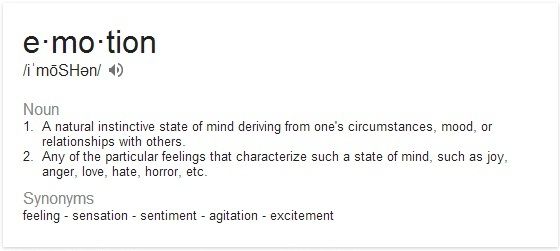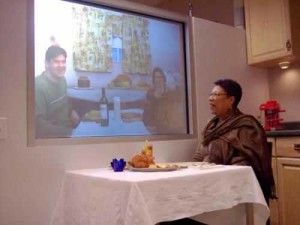Emotions and Longevity:
If the picture header above influenced you to click to read more of this article, then it establishes at least part of my hypothesis: Visual stimuli that trigger our primal urges, supersede all our senses, even over-riding intellect. By that I mean, irrespective of IQ level, the visual alone and not the title of the essay will have prompted a click through –Classic advertising tactic: Sex sells.
Yet, could there be a clue in this behavior to study further, in our quest for Longevity? Before Transhumanism life extension technology such as nano-tech and bio-tech go mainstream… we need to keep our un-amped bodies in a state of constant excitement, using visual triggers that generate positive emotions, thereby hopefully, keeping us around long enough to take advantage of these bio-hacks when they become available.
Emotions on Demand — The “TiVo-ing” of feelings:
From the graphic above, it is easy to extrapolate that ‘positive’ emotions can contribute significantly to Longevity. When we go on a vacation, we’re experiencing the world in a relaxed frame of mind and encoding these experiences, even if sub-consciously, in our brains (minds?). Days, or even years later we can call on these experiences, on-demand, to bring us comfort.
Granted, much like analog recordings… over time, these stored copies of positive emotions will deteriorate, and just as we can today digitize images and sounds, making for pristine everlasting copies… can we digitize Emotions for recall and to experience them on-demand?
How would we go about doing it and what purpose does it serve?
Digitizing Touch: Your Dirrogate’s unique Emotional Signature:
Can we digitize Touch; a crucial building block that contributes to the creation of Emotions? For an answer, we need to look to the (and to some, the questionable) technology behind Teledildonics.
While the tech to experience haptic feed-back has been around for a while, it’s been mostly confined to Virtual Reality simulations and for training purposes. Crude haptic-force feedback gaming controllers are available on the market, but advances in actuators, and nano-scale miniaturization are soon to change that, even going as far as to give us tactile imaging capability — “Smart Skin”
Recently, Durex announced “Fundawear”. It’s purpose? To experience the “touch” of your partner in a fun light-hearted way. Yet, what if a Fundawear session could be recorded and played back later? The unique way your partner touches, forever digitized for playback when desired… allowing you to experience the emotion of joy and happiness at will?
Fundawear can be thought of as a beta v1.0 of something akin to smart-skin in reverse, which could eventually allow a complete “feel-stream” to be digitized and played back on-demand.
Currently we are already able to digitize some faculties that stimulate two of our primary senses:
- Sight — via a video camera.
- Sound — via microphones.
So how do we go about digitizing and re-creating the sense of Touch?
Solutions such as the one from NuiCapture shown in the video above, in combination with off the shelf game hardware such as the Kinect, can Digitize a whole body “performance” — Also known as performance capture.
Dirrogates and 3D Printing a Person:
In the near future if we get blue-prints to 3D print a person, ready for re-animation and complete with “smart-skin”… such a 3D printed surrogate could reciprocate our touch.
It would be an exercise in imagination, to envision 3D printing your partner, if they couldn’t be with you when you wanted them, or indeed it could raise moral and ethical issues such as ‘adultery’ if an un-authorized 3D printed copy was produced of a person, and their “signature” performance files was pirated.
But with every evil, there is also the good. 3D printers can print guns, or as seen in the video above: a prosthetic hand, allowing a child to experience life the way other children do — That is the ethos of Transhumanism.
Loneliness can kill you:
Well maybe not exactly kill you, but it can negatively impact your health, says The World of Psychology. That would be counterproductive in our quest for Longevity.
A few years ago, companies such as Accenture introduced family collaboration projects. I recommend clicking on the link to read the article, as copyright restrictions prevent including it in this essay. In essence, it allows older relatives to derive emotional comfort from seeing and interacting with their families living miles away.
At a very basic level, we are already Transhuman. No stigma involved… no religious boundaries crossed. This ethical use of technology, can bring comfort to an aging section of society, bettering their condition.
In a relationship, the loss of a loved one can be devastating to the surviving partner, even more so, if the couple had grown old together and shared their good and bad times. Experiencing and re-living memories that transcend photographs and videos, could contribute towards generating positive emotions and thus longevity in the person coping with his/her loss.
While 3D printing and re-animating a person is still a few years away, there is another stop-gap technology: Augmented Reality. With AR visors, we can see and interact with a “Dirrogate” (Digital Surrogate) of another person as though they were in the same room with us. The person’s Dirrogate can be operated in real-time by another person living thousands of miles away… or a digitized touch stream can be called on… long after the human operator is no more.
In the story: “Memories with Maya”, the context and it’s repercussion on our evolution into a Transhuman species, is explored in more detail.
The purpose of this essay is to seed ideas only, and is not to be taken as expert advice.




3D people printing. A different way of cloning. :-)
After watching the makerbot video above (did pull at some heart strings, hearing the children speak towards the end)… the idea of blue-prints for a whole body 3D printout came.
Every person should get themselves laser scanned for posterity. At the very least a lowcost “Senect” 3D scan: http://www.faro.com/scenect